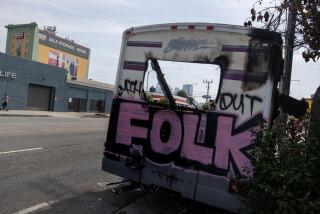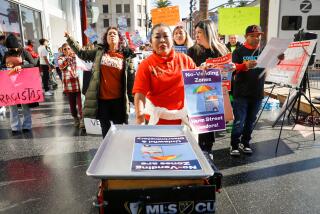Anaheim Drops Appeal of Ruling on Street Vendors : Courts: City decides a legal battle would polarize neighbors and those who sell wares from vehicles.
- Share via
ANAHEIM — The city attorney said Wednesday that his office will not appeal a recent court ruling that street vendors are legal in the city.
City Atty. Jack L. White said the City Council decided Tuesday not to take the case to the state Supreme Court partly because there was little chance of success.
Also, he said, a prolonged legal fight would have polarized both sides--the vendors who sell their wares from the back of parked vehicles and homeowners who want to see them banned--making compromise impossible.
“We want to establish a committee that can work this out, and an appeal would have driven people from the middle ground,” White said. “We want to allow the vendors to make a living, while also protecting the residents in the affected neighborhoods.”
The recent ruling by the state 4th District Court of Appeal forbids Anaheim to ban vendors in residential neighborhoods. The court said state law does not allow cities to forbid street sales.
White said that the city has asked the state Legislature to revise that law but that Anaheim would not necessarily eliminate vending if given the opportunity.
“It’s a question of home rule,” White said, adding that cities should have the ability to ban certain businesses for good cause.
City Councilman Bob D. Simpson said Wednesday that he has been asked to mediate a committee of vendors and residents to seek a compromise and that he might do so.
Salvador Sarmiento, the vendors’ attorney, said that the city’s decision was “good news” and that he, too, hopes that both sides will now compromise.
“This allows the vendors to stop worrying about their jobs,” Sarmiento said. “They know now that tomorrow and the next day and the day after that they are going to be able to work.”
Susan Kocsis, a homeowner and a member of Neighborhoods Opposed to street Vending in Anaheim or NOVA, agreed with White that asking the Legislature to allow cities to ban vending seems to be Anaheim’s best route. But, she said, the only compromise she will agree to is one “that keeps vending trucks out from in front of my house.”
“I can’t open my front door and sell oranges, so why should somebody be allowed to park 30 feet away and do it,” Kocsis said.
After months of heated arguments between vendors and homeowners, the council last September approved an ordinance banning street vendors from residential neighborhoods but allowing them to sell in commercial areas.
Residents convinced a council majority that the vendors hurt residential neighborhoods because they are noisy and their customers often scatter litter.
But the vendors, who sell everything from produce to cigarettes to clothes to furniture from the back of trucks and vans, said they try to be good neighbors and they would be put out of business by the ordinance.
The vendors sued and asked a Superior Court judge to grant an injunction forbidding the city’s enforcing the ordinance pending the suit’s trial, which was scheduled for this fall. They said enforcement of the ordinance would drive them out of business even before their suit was heard.
Last November, the Superior Court judge refused, but the 4th District Court of Appeal quickly issued a temporary restraining order. The court issued a permanent restraining order last month, saying state law clearly says that cities cannot ban vending and that Anaheim would lose if the vendors’ suit was tried.
More to Read
Sign up for Essential California
The most important California stories and recommendations in your inbox every morning.
You may occasionally receive promotional content from the Los Angeles Times.










